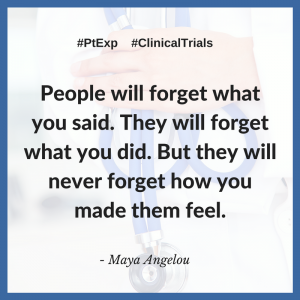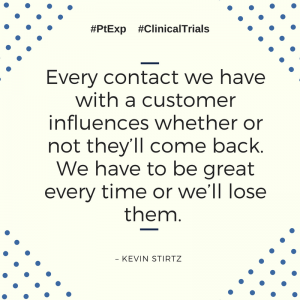Patient Experience Week: Let’s talk about the #PtExp in clinical trials
This week is Patient Experience week. It is an annual event, that was started by and inspired by members of the Beryl Institute community to celebrate healthcare staff impacting patient experience everyday. It’s message is spreading globally, and for good reason. It just makes sense for healthcare institutions to improve the experience for patients, as better outcomes generally follow.
 I think we can all recall experiences in our own healthcare journeys that were great, and not so great. The way these experiences make us feel often drive how, when and with whom we interact for our future health care.
I think we can all recall experiences in our own healthcare journeys that were great, and not so great. The way these experiences make us feel often drive how, when and with whom we interact for our future health care.
While the week is devoted to improving the experience of healthcare in general, we think it is a great opportunity to also think about the experience of patients (and their carers) that get involved in clinical trials, given this may be part of the healthcare journey for some.
Alot is generally expected from clinical trial participants and their families. At the same time as they are dealing with a specific health issue, they may need to turn up for extra visits that can be long, undergo extra procedures, remember to take medication, fill in diaries or wear devices that transit data. Whilst individuals will be hoping for a personal benefit from participating in a trial, that cannot be guaranteed. And so we are reliant on these fantastic individual’s altruistic motives to remain engaged in trials, helping to deliver the evidence that will shape the knowledge of the medical profession as to the way to best treat that condition.
For this reason, we believe those enrolling patients in clinical trials should be aiming to deliver a gold-plated healthcare experience. Its the least we can do for the effort those participating are making, and the disruption trials might cause to their work, personal and family lives. There should be no waiting for visits, expectations should be clearly explained, communication with the trial site staff should be clear and in line with the patient’s needs, the time impact of visits and trial requirements outside of visits should be minimised. They should feel valued, and their efforts appreciated.
Most other industries focus on customer service in order to keep people coming back. While there is a growing movement toward making clinical trials more patient-centric, we still don’t often ask clinical trial participants about their experience, whether good or bad, in order to keep them engaged and make it better for the next trial participant.
I had the pleasure of working with trial sites that go out of the way to make the trial experience great, with tea and biscuits, movie passes for carers, thankyou morning teas, reminder calls before visits, birthday and Christmas cards, etc. They really think about the patients and families involved and where it shows is usually in their recruitment and retention metrics. Sadly though, this is not all sites.
So what is your experience as a patient being involved in clinical trials. Do you get outstanding service that makes you want to come back, or tell your friends?
As trial site staff, what do you do to make the experience great? What tips can you share with other sites that will help keep patients coming back and spread word-of-mouth referrals?
We can only collect the data to advance medicine if patients get involved in research. Let’s make clinical trials a gold-class experience, and one patients are kicking down the doors to get involved in!
– Janelle Bowden
PS. Coming up Fri May 5th, the next #AusCT Twitterchat hosted by @Res4Me will be talking about the role of patients and health consumer reps in clinical trials. Join in using the #AusCT hashtag, 12.30pm AEST (Sydney time) and share your experiences.




Sorry, the comment form is closed at this time.